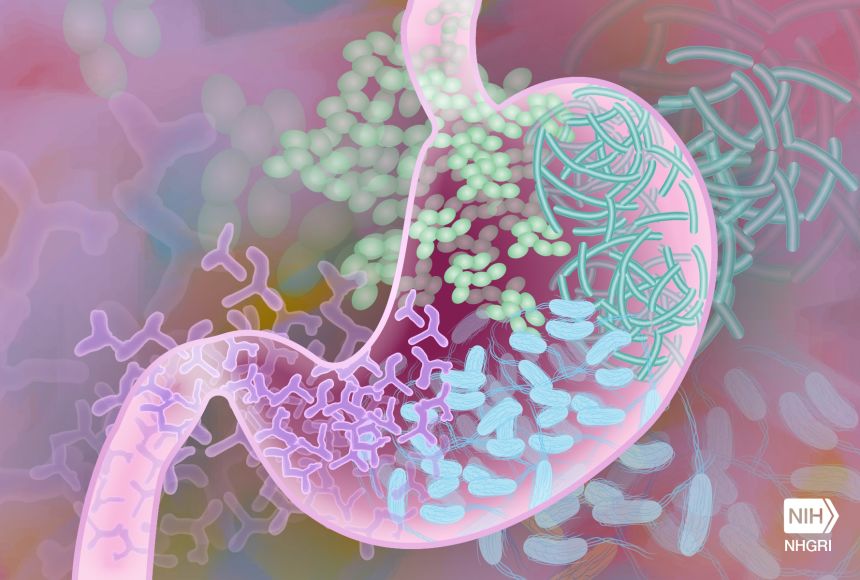Your gut is home to a rich collection of bacteria that play an important part in digestion. Our guts, or intestines, produce enzymes, which are substances that help break down food. Sometimes, our enzymes can't deal with certain foods, like beans. That's when our gut bacteria step in. They chomp down on those bean molecules, creating gas in the process.
But gut bacteria do much more than play a role in human nutrition. The key to whether we're fat or thin, cheerful or depressed, healthy or sick may lie in the gut microbiome. A microbiome is the collection of microorganisms, like bacteria, in a particular place. Your gut's microbiome is home to hundreds of species of bacteria.
Poop Is Everywhere, But That's A Good Thing
You start collecting your gut bacteria at birth, when you pass through your mother's birth canal. You pick up even more bacteria through your mother's milk. Milk contains substances that can only be digested by bacteria, specifically by Bifidobacterium infantis. This is a helpful bacterium that makes itself at home in the baby's digestive passage and helps prevent infections. Milk also functions as a probiotic, or a substance that helps good bacteria grow. In addition, milk is a prebiotic. This means that it supplies your gut bacteria with something to eat.
By the time kids turn 3, they are usually introduced to solid foods and can crawl around on the floor. By this age, their internal microbiomes are fully established. This means that they have come in contact with large numbers of fecal particles — bits of poop. According to scientists who study microorganisms, the environment is pretty much coated in fecal particles.
It might sound creepy, but it is a good thing. The bacteria that we pick up can provide us with enzymes and vitamins. They help us battle infections, and they make chemicals necessary for our mental health and well-being. For example, serotonin is a chemical that sends signals between nerve cells, and it affects our mood, appetite, sleep, memory and learning. Ninety percent of the body's serotonin is made by gut bacteria.
Junk Food Can Kill Off Good Bacteria
Our personal bacteria also protect us from a wide range of illnesses. Scientists think that the increase in some sicknesses in the population means that something is going seriously wrong in terms of bacteria. The modern rise in the number of people who are overweight, have allergies, asthma, arthritis and anxiety attacks may be related to the bacterial populations in our guts.
The problem here might be a leaky epithelium. The epithelium is the lining of the digestive tract, and it usually acts as a barrier between your gut bacteria and the rest of the body. Bacteria keep epithelial cells healthy by providing them with nutrition. But without the right nurturing bacteria, the epithelium breaks down. Bacteria and toxic bacterial by-products enter the bloodstream. This sends a signal to the immune system, alerting it to the presence of invaders. This can lead to inflammation and, eventually, disease.
In industrialized nations like the United States, a sanitized lifestyle and a diet of processed foods have killed off some of our body's microorganisms. So have antibiotics, which are medicines that fight against bacterial infection. The result is a microbiome that does not have many helpful types of bacteria. Many modern diseases may be occurring because our microbiomes aren't what they used to be.
A diet of junk food doesn't do our bacteria any good, either. Tim Spector is a scientist who studies diseases. In an experiment, he convinced his adult son to spend 10 days on a dedicated fast-food diet of fries, burgers, chicken nuggets and Coca-Cola. By the end of 10 days, he had lost one-third of the bacterial species in his gut.
Exercising, Eating Fiber-Rich Foods Can Help
How can you keep your microbiome healthy? Scientists and doctors say that you should not depend too much on the probiotic supplements available in the market. Instead, they recommend a diet rich in probiotic fermented foods, or foods in which the molecules are broken down by yeast or bacteria. Examples include yogurt, sauerkraut, kimchi and miso soup. They also suggest fiber-rich foods, like whole grains, fruits and vegetables. It is also a good idea to avoid processed foods, which do not provide much nourishment for your gut bacteria.
Exercise also seems to benefit our guts. In one study, researchers compared rugby players to nonathletes and found that the rugby players had more diverse microbiomes, with higher proportions of at least 40 different bacterial species.
While antibiotics are sometimes necessary, we should be cautious about overusing them. Studies show that that the gut microbiome can take up to a year to bounce back after a course of antibiotics, which can wipe out lots of bacteria, both good and bad.
Finally, you might want to expand your environment. The more different kinds of bacteria you pick up, the better. So meet new people, pat the dog, dig in the garden and play in the dirt.

